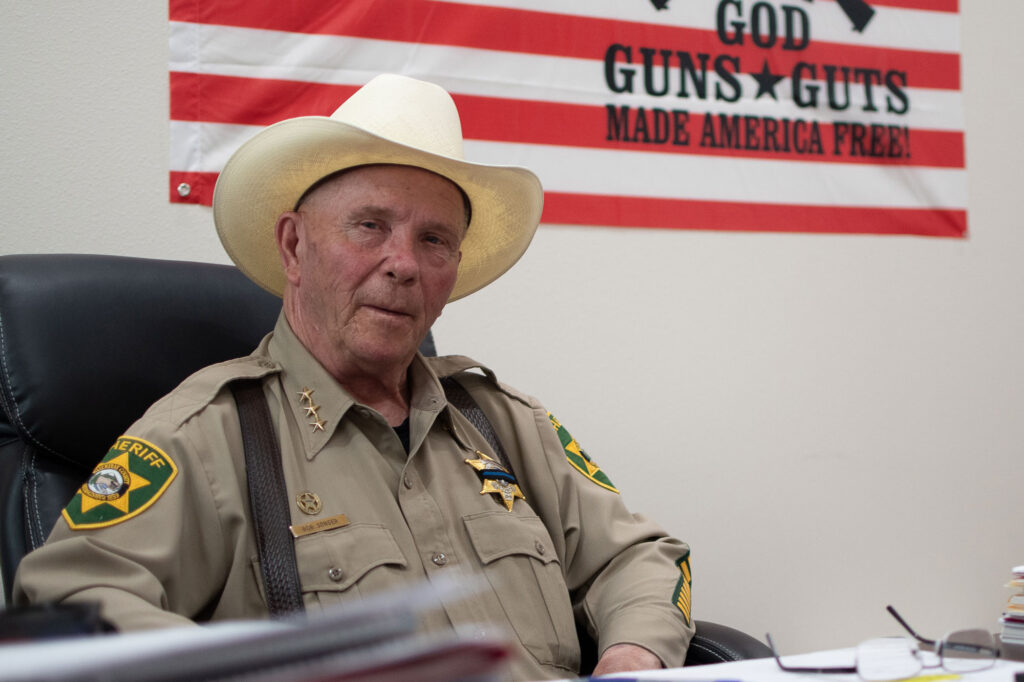Klickitat County Sheriff Bob Songer, a prominent figure in the constitutional sheriffs movement, is known for his controversial approach to law enforcement. In a July 2023 meeting with members of his volunteer posse, he discussed plans for supporting wildfire evacuations in the predominantly Democratic town of White Salmon, Washington. Songer’s posse consists of around 170 volunteers, many of whom are in their 60s and hail from farming and ranching backgrounds. This expansive posse, which outnumbers the several full-time deputies, operates under minimal oversight and regulations, as Washington law allows for the formation of such volunteer groups without strict guidelines from state agencies.
Songer’s position within the constitutional sheriffs movement is marked by a commitment to resist certain state and federal laws he deems unconstitutional, particularly regarding gun control and public health directives. He has expressed willingness to mobilize his posse against any authority attempting to confiscate firearms, drawing comparisons to historic standoffs that have occurred in the West. In practical terms, the posse assists the sheriff’s office with various roles, such as providing security at events and covering emergency calls, which is crucial in a county facing budget constraints and a small law enforcement staff. It is a utility-focused group, yet it has raised concerns among residents and observers due to its association with ideologies that sometimes align with far-right sovereign citizen movements.
Despite the posse’s practical contributions, critics are wary of its implications. Questions around the potential for increased violence and vigilantism persist, especially considering the absence of external oversight and formal training. Detractors point to the sheriff’s unorthodox operational style and the possibility of the posse being weaponized against political opponents. These sentiments are echoed by former law enforcement officials who worry about the implications of embedding non-certified civilians with limited oversight within the sheriff’s operations. They express concerns about the risks related to the growing responsibilities of the posse and the inherent liability for the county should serious incidents occur involving volunteers during their duties.
Songer has faced backlash from locals for his staunch refusal to enforce certain laws and his alignment with the ideas promoted by the Constitutional Sheriffs and Peace Officers Association, which advocates for sheriffs’ authority over federal and state mandates. His rhetoric has been perceived as increasingly aggressive, suggesting preparedness to confront violating authorities. The posse’s actions during politically charged events, especially during Black Lives Matter protests, have raised alarms, indicating that the implications of such a group extend beyond mere community service and reflect a readiness to emerge as a political arm of the sheriff’s leadership.
The origins of Songer’s posse lie in historical references to local ranchers’ self-defense actions against thieves but have since evolved into a contemporary structure facing scrutiny for its political leanings. As the county’s budget shrinks and resources become scarce, the posse has been regarded as a cost-effective means of expanding the sheriff’s office capability; however, the blending of community service and political ideology complicates the narrative surrounding its operations. Critics highlight that the historical context, intertwined with current events, risks perpetuating a mindset that sovereignty comes with disregard for unified governance.
Looking forward, Songer has indicated intentions to remain involved with the posse even after he steps down from his role as sheriff in 2026. His vision for the group as a model for other counties has sparked interest throughout the Northwest, indicating a potential rise in similar volunteer organizations that mirror Klickitat County’s model. The trajectory of the posse and any subsequent leadership changes will be crucial in determining its future direction and operational integrity. As controversies persist, many community members seek a shift in culture and approach—hoping for a return to a focus on community safety that prioritizes accountability and transparency in law enforcement.

